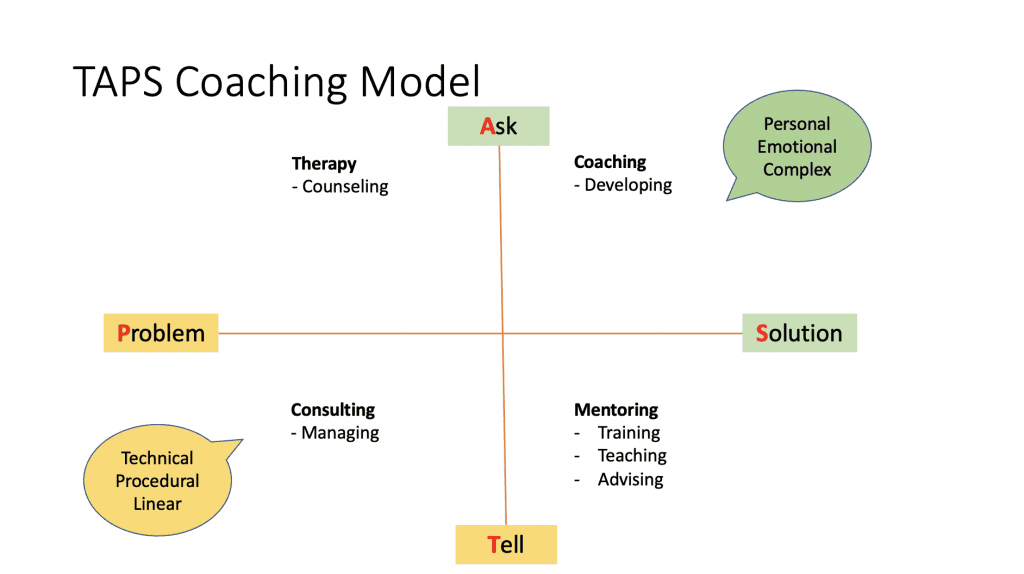
Take a look at any Fortune 500 company today and chances are you’ll find the fingerprints of one of the major consulting firms like Bain, McKinsey, or Boston Consulting Group behind some of their biggest decisions. It’s a $200 billion industry once known as the gold standard for business strategy.
Lately, that’s changing. CEOs and executive teams are increasingly hiring coaches to help guide them through tough business decisions. And according to Forbes, the executive coaching market is set to eclipse consulting over the next five to ten years.
But do you need a consultant…or a coach? And what’s the difference?
I’ve been on both sides of the equation as a coach and as a consultant, and they serve different functions for your business and for your executive team. Here’s what you need to know about hiring a consultant vs. hiring a coach:
1. Coaches ask questions
The biggest difference between coaching and consulting? Coaches guide you to the right answer tailored to your business, rather than telling you what to do or using the same playbook every other company receives.
The way they do this is by asking questions that get to the heart of the matter. “What are the specific and measurable initiatives that will lead you to the outcome you want? What is the organization of the future that will drive the intended growth? If it is good then, why not now?” are all common questions you’ll hear from coaches, which point you toward long-term solutions to business problems and help you see blind spots on your own, so you’ll find them again in the future.

2. Coaches develop your skills
Often, clients will say, “I don’t need business coaching. I just want to become a better leader.”
What they don’t realize is that leadership works in the context of the business. Leaders inspire belief, drive performance, and hold people accountable — so to become a better leader, you have to become better at business.
Let’s take the classic case of growing your revenue. It’s what we’re all chasing, right? Coaches walk you through the overall decision tree with probing questions. For example, do you want to focus on acquiring new customers to generate revenue or optimize existing customer relationships? Do you have the right team in place to support growth? Can we upgrade their skills or do we need to hire a dedicated resource?
There’s no right answer there. A consultant is going to think in a linear, procedural way to tackle this problem, pulling from an established playbook. But a coach leads you through the thought process so you can build your skillset and become a better leader. That way, next time you’re facing this problem, work your way toward a solution as a team.

3. Coaches focus on solutions
When you hire a consultant, you’re hiring a team to solve a specific problem that you’ve already identified or to fill a specific knowledge gap. A consultant has a timeframe, and once that time is up or the problem is solved, their engagement is over.
Let’s say you hire a team of marketing consultants to assess your product-market fit. You may get a completely different perspective on your customers and your products by running focus groups or analyzing your brand that you may currently not have the bandwidth to do. They can determine how to fill the gap so you have a better product-market fit. But once consultants give their final presentation with their recommendations, it’s up to you to implement their advice.
That’s where all kinds of new challenges crop up. Now that the product is a better market fit, does your sales team know how to sell it? Are you able to track your pipeline from start to finish? How many emails are you sending? It’s a coach that can illuminate your next big gap, like needing a better sales system that your entire team can use. From there, you’d hire a technical consultant that can get the software up and running and train your team to use it in the future.
Coaches help you figure out what your problems are in the first place, and help you build your own capabilities to solve them today — and in the future.

4. Coaching can be lifelong
Don’t get me wrong — as a consultant in my previous life, I’ll be the first to tell you they can be a valuable asset for your team. But a coach helps you define the solution and what it would take to implement the solution. And the next solution. And the next.
Coaching can be a career-long journey. I have clients I’m still working with after five years or more, and we continue to solve challenges together because there’s always something getting in the way of growth. What that looks like at CEO Coaching International isn’t actually pure coaching, but a mix of coaching, consulting, mentoring, and therapy to help our clients solve their problems.



Learn How You Can Benefit From Coaching

About Don Schiavone
Don Schiavone currently leads CEO Coaching International as Chief Operating Officer and Managing Director, where he has been a driving force behind the formalization of the Make BIG Happen System over the years. Prior to CEO Coaching International, Don spent more than 30 years leading high-growth businesses using an in-depth understanding of technology with a data-driven “test-everything” philosophy: You can’t manage what you can’t measure. Don’s approach to coaching focuses on three pillars of success: people, process, and systems, in that order.


About CEO Coaching International
CEO Coaching International works with CEOs and their leadership teams to achieve extraordinary results quarter after quarter, year after year. Known globally for its success in coaching growth-focused entrepreneurs to meaningful exits, CEO Coaching International has coached more than 1,000 CEOs and entrepreneurs in more than 60 countries and 45 industries. The coaches at CEO Coaching International are former CEOs, presidents, or executives who have made BIG happen. The firm’s coaches have led double-digit sales and profit growth in businesses ranging in size from startups to over $10 billion, and many are founders that have led their companies through successful eight, nine, and ten-figure exits. Companies working with CEO Coaching International for two years or more have experienced an average revenue CAGR of 31% (2.6X the U.S. average) and an average EBITDA CAGR of 52.3% (more than 5X the U.S. average).
Learn more about executive coaching | Meet our world-class coaches





